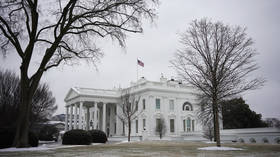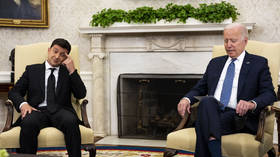US imposes sanctions on Donbass republics

US President Joe Biden has announced sweeping new sanctions on the Donetsk and Lugansk People’s Republics, following the decision of Russian President Vladimir Putin to recognize them as independent and sovereign states.
The text, published to the White House’s website on Monday evening, seeks to economically stifle the two Donbass republics.
“The Russian Federation’s purported recognition of the so-called Donetsk People’s Republic (DPR) or Luhansk People’s Republic (LPR) regions of Ukraine contradicts Russia’s commitments under the Minsk agreements and further threatens the peace, stability, sovereignty, and territorial integrity of Ukraine,” the official White House statement says, calling it an “unusual and extraordinary threat to the national security and foreign policy of the United States.”
The new sanctions will include a ban on investments in the DPR and LPR, as well as any import of the region’s goods, services, or technology to the United States. America is also banned from exporting anything to the republics. Furthermore, Washington has made it completely illegal for any American citizens to conduct financial transactions with the breakaway states, and it has also frozen DPR and LPR assets currently in US banks.
From now on, any individual involved in business or politics on the territory of the newly recognized republics may be subject to personal sanctions from the US.
The crisis in the Donbass began in 2014, following the events of the Maidan, when violent street protests toppled the democratically elected government in Kiev. Shortly after, two regions in the east of the country declared themselves to be independent states.
In the past, Moscow had refused to recognize the breakaway states as sovereign, instead calling for them to be reintegrated into Ukraine with a special status under the 2014 and 2015 Minsk agreements.
However, on Monday, after almost a decade of stalemate in the peace process, Putin declared them to be independent nations, something he had previously ruled out.













